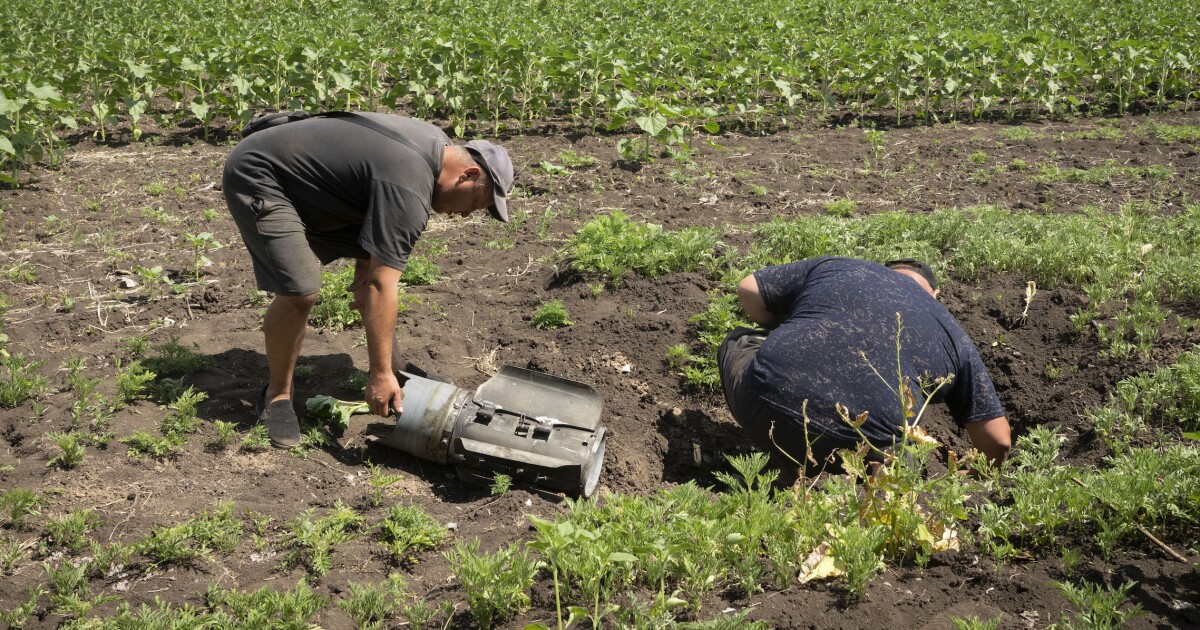

Food prices will remain elevated for years due to the war in Ukraine and other inflationary factors, a senior U.S. official predicts.
“We’re dealing with a number of issues that are having an impact on inflation, that are not issues that can be easily solved,” State Department special envoy Cary Fowler said Wednesday. “I think we’re dealing with a multi-year crisis and we ought to plan in that regard.”
Russia’s blockade of Ukrainian ports on the Black Sea has taken one of the world’s largest food providers off the international market, in an apparent plan to gain leverage against Ukraine and Western powers. That maneuver has contributed to a surge in food prices around the world, as U.S. and European officials scramble to develop alternative strategies to arrange the secure export of Ukraine’s vast stockpiles of grain.
“When Russia invaded the Ukraine, we were already in the midst of what we probably could have called a world food crisis anyway,” Fowler, whom Secretary of State Antony Blinken tapped as his point-man for global food security in May, told the Atlantic Council’s European Union-US Defense and Future Forum in Washington. “When you look at the current acute crisis that we face, you have to say to yourself and you have to get into the mindset that this is a three-year crisis.”
RUSSIA CLOSE TO TRIGGERING FAMINE THAT WILL KILL MILLIONS, CINDY MCCAIN SAYS
The Russian blockade of the Black Sea has prevented Ukrainian farmers from exporting their crops and also interrupted their customary plans to prepare future harvests. U.S. officials has resisted proposals from some allies to participate in a naval operation to force Russian President Vladimir Putin to lift the blockade, as President Joe Biden continues to avoid risking a direct military confrontation with Russia, and the options for exporting the crops by land don’t match the lost capacity of the Black Sea ports.
“It’s a huge task, but we’re encouraged with the progress we’ve made to date,” the European Commission’s Michael Scannell said during the discussion. “For example, last month, we saw up to 1.8 million tons of grains moved. In the month of June, it could be anything up to 2.5 tonnes. Now, this falls far short of the five [or] six million tonnes that could be moved if the Black Sea ports were available, but nonetheless, it’s going in the right direction, and those efforts will continue.”
The scale of Ukraine’s typical contribution to the global market means that the blockade has raised the specter of severe famines in various countries. A prominent Russian state media personality suggested this week that such food shortages would benefit Russia as the war unfolds.
“All our hope is in the famine,” RT editor-in-chief Margarita Simonyan said during the St Petersburg International Economic Forum, attributing the statement to unnamed Russian citizens. “Here is what it means . . . It means that the famine will start now and they will lift the sanctions and be friends with us, because they will realize it’s necessary.”
That looming crisis has touched off a geopolitical blame-game between Russia and the U.S. alliance network, as the developing countries most threatened by a prospective famine could put pressure on either Ukraine or Russia at the United Nations General Assembly, depending on whom they regard as the cause of the food shortages.
“The reality is that Russia’s attacks on Ukraine’s ports, warehouses, and transportation networks as well as Russian warships’ harassment of shipping lanes in the Sea of Azov and the Black Sea have shut down Ukraine’s exports, including exports of food,” State Department assistant secretary Ramin Toloui said Wednesday during a teleconference briefing with an international assortment of journalists. “Because of Russia’s aggression, this season’s corn harvest in Ukraine is down by half from last year, and Ukrainian farmers are impaired in their ability to sow winter wheat.”
Toloui touted Fowler’s arrival at the State Department as a boost to International efforts to “plan for more resilient food systems.” Fowler, who helped found the Global Seed Bank, emphasized that “short term in this situation equals three years,” even with canny policy responses.
CLICK HERE TO READ MORE FROM THE WASHINGTON EXAMINER
“At least in the food space, we’re dealing with a number of issues that are having an impact on inflation, that are not issues that can be easily solved snap of a finger,” he said. “When dealing with climate change. We’re dealing with COVID and supply chain problems and we’re dealing with conflict. And we also have historically low grain stockpiles, and we’re in the high point of a cycle for fertilizer prices. So, if you really wanted to have a huge impact impact on food prices, you’d probably have to be dealing with all of those. And unfortunately, that’s rather difficult and can’t be done overnight.”







